The Caspian Policy Center Hosts its 2nd Caspian Connectivity Conference in London
Recent Articles
Author: Caspian Policy Center
06/11/2024
London, UK, June 11, 2024 —Focusing on the theme, How to Maximize the Middle Corridor, the Caspian Policy Center (CPC) hosted a second Caspian Connectivity Conference at Arundel House in Temple Place, London. The event brought together key stakeholders from the United Kingdom (UK) and the Caspian Region to discuss and strategize how to enhance connectivity and trade across the Middle Corridor, which connects countries in the Caucasus and Central Asia to Europe, China, and South Asia.
The packed event featured senior economic, finance, and development experts from the United Kingdom and from countries across the Caspian region who discussed policy objectives and practical efforts for enhancing connectivity along the Middle Corridor that stretches across the Caucasus and Central Asia. Also speaking were senior experts from international organizations, financial institutions, and private-sector representatives who suggested ways to prioritize investments in the region and how to improve the regional business climate.
The event commenced with welcoming remarks by CPC President Efgan Nifti who noted, “The developments witnessed in the Caspian region in the last 12 months have been remarkable. These include progress in the development of the Middle Corridor, ongoing reconciliation steps between Armenia and Azerbaijan, heightened levels of engagement and investment from a diverse array of global donors, the enduring ramifications of Russia’s unprovoked war of aggression against Ukraine, challenges posed by climate crises, matters concerning Black Sea security, the ongoing energy transition, and the increasing significance of critical minerals.”
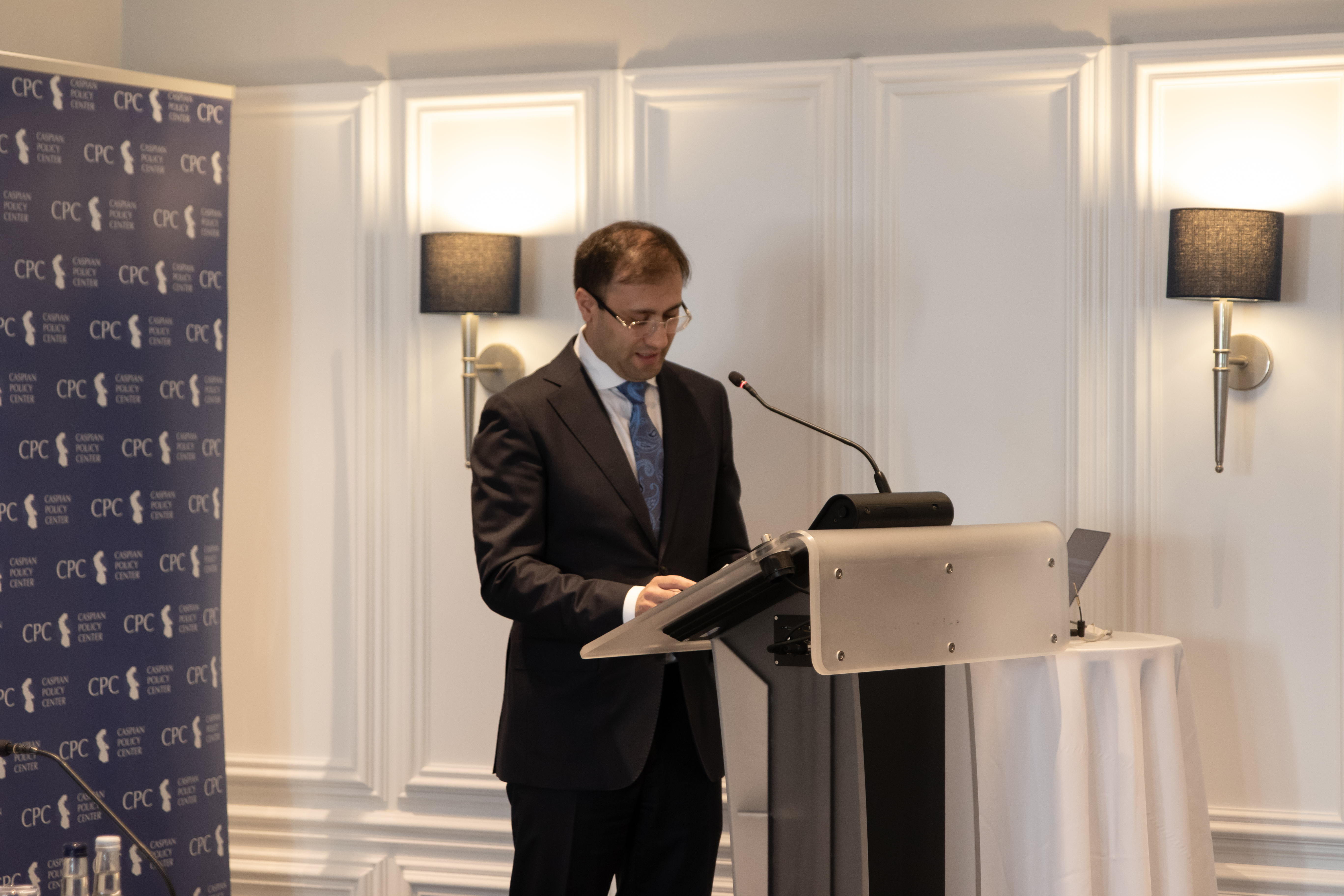
Nifti further emphasized, “The Caspian region is a hidden gem packed with potential, especially for international trade. This is where the Middle Corridor emerges as a game-changer. This network of routes redefines connectivity, offering a faster, more efficient passage between East and West.” Noting that Russian trade routes are hampered by sanctions, while maritime trade is constricted by hostilities in the Middle East, Nifti concluded, "The need for diversification of trade routes is obvious. This has injected new momentum into the development of regional transport connectivity in Central Asia and the South Caucasus. Further support of projects such as the Middle Corridor not only will boost political and economic relations within the region, but also will support regional goals for connectivity, energy diversification, and long-term development.”
In addition to Nifti’s welcoming remarks, David Moran, CPC’s Senior UK Advisor spoke about the opportunities for the region in the run up to COP29 that will be held in Baku, Azerbaijan, in November this year. “The green agenda isn’t just about cutting emissions, however important. Adaptation to cope with the consequences of climate damage requires building resilience. Sustainability of physical infrastructure must be baked right in at the start at the design stages, and the Baku climate summit will be discussing all angles of sustainability,” he said. “COP29 provides a rare opportunity to showcase the needs, challenges, potential, and strengths of the Caspian region.”
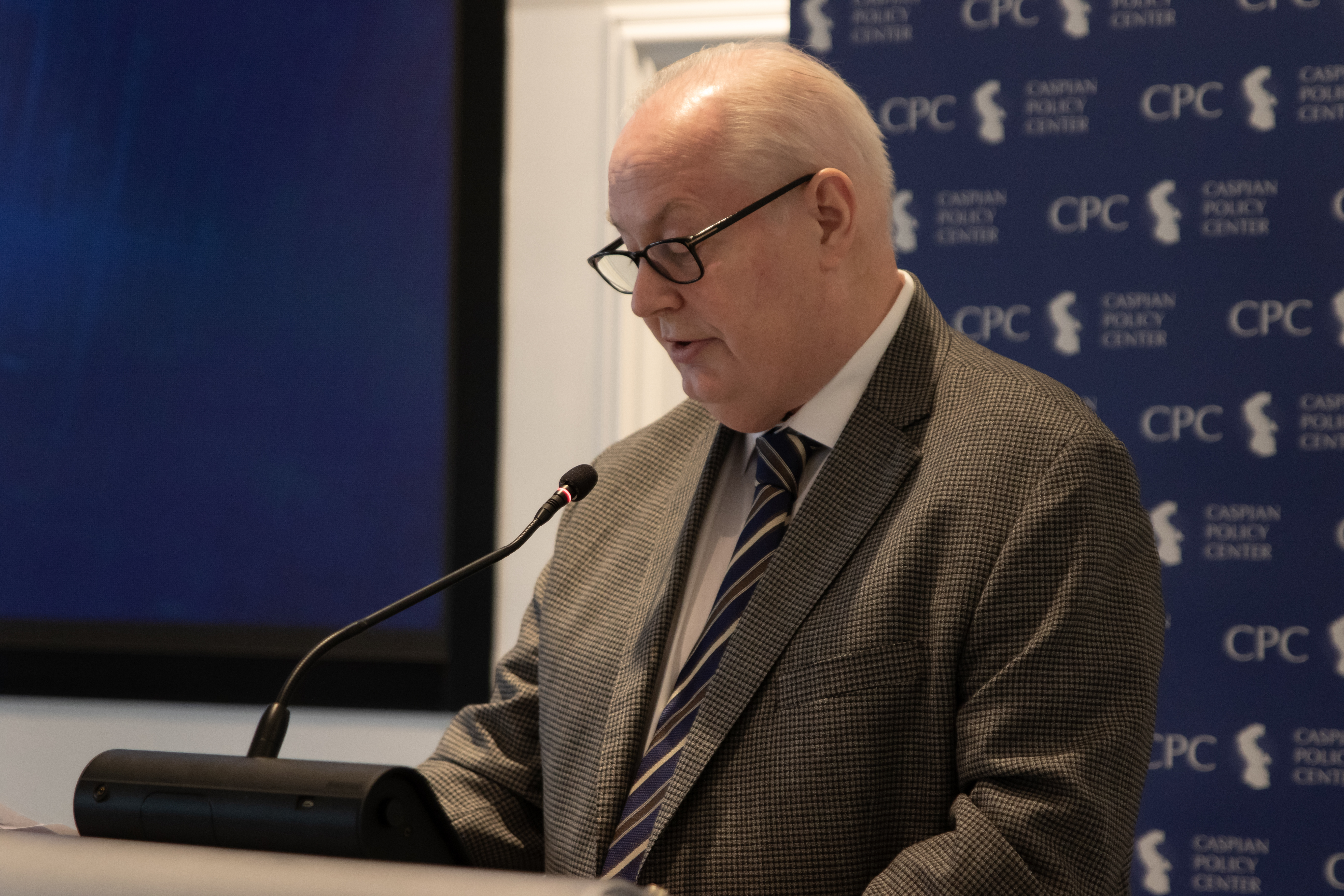
CPC Board Member James Sharp emphasized the need to focus on specific chokepoints along the Middle Corridor to optimize its efficiency, “If you want to speed up the transit time for the Middle Corridor, you focus on those Caspian ports, those chokepoints, looking at both hard connectivity, such as port infrastructure, and soft connectivity, like customs regulations.” Emphasizing the linkage between better connectivity and support for economic development, Sharp spoke of how Caspian countries can add value, rather than simply export raw materials.
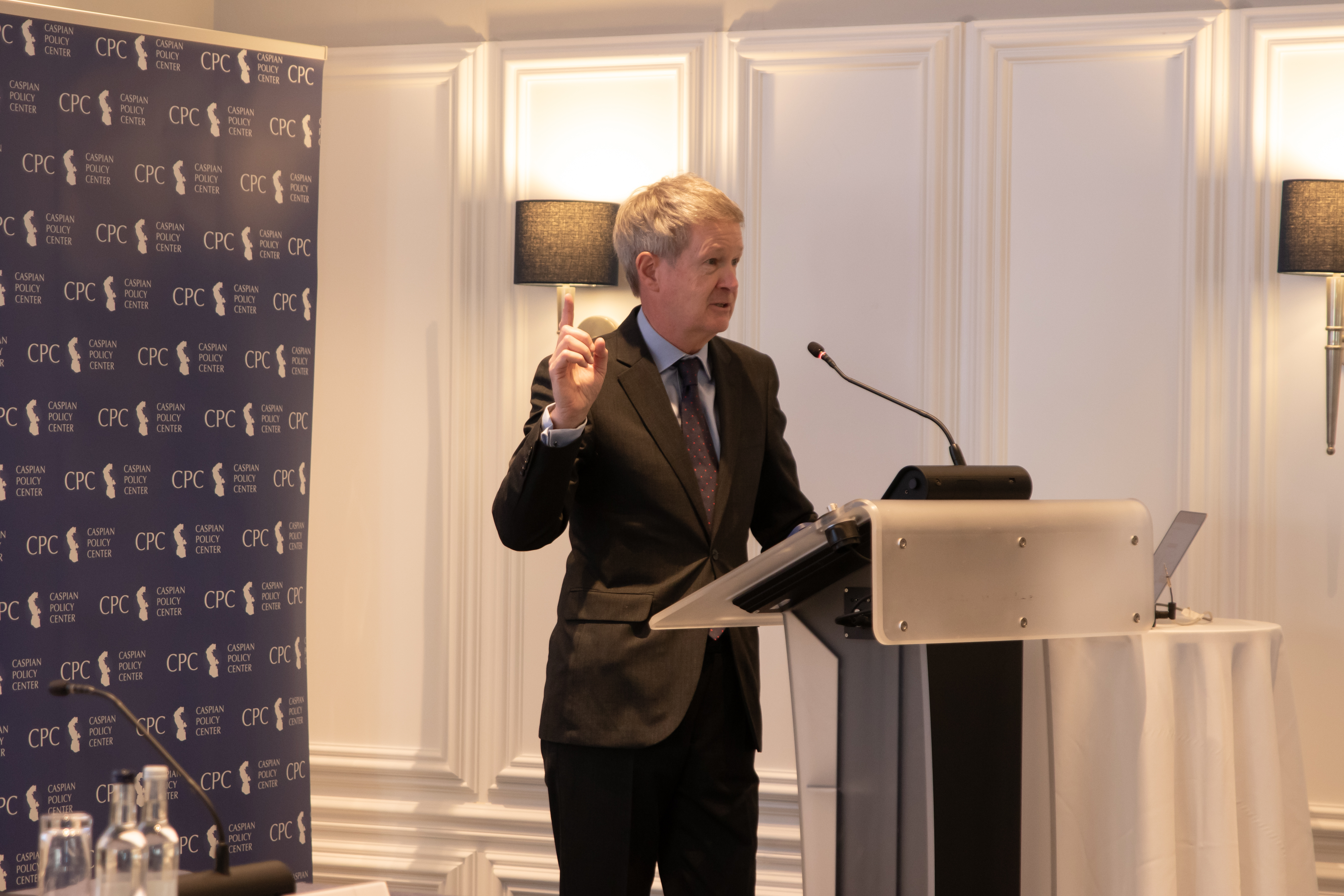
“The approach today isn’t just about the challenges of the Middle Corridor,” he stressed, “it’s actually about the opportunities. That’s what we’re really here to talk about…”. Sharp added, “It provides great benefits for the countries themselves to promote and provide regional connectivity to help the countries either connect with each other or to allow them to connect with the outside world.”
The first address of the Conference’s ambassadorial panel was delivered by Ambassador of Georgia Sofio Katsarava who spoke on the importance of commitment and consistency in the region in order to continue the demand for infrastructural projects. “More engagement from the EU and engagement from the UK can be achieved through these kinds of discussions and visits,” she said, “actually seeing the potential of Georgia as a contributor to the Middle Corridor.”
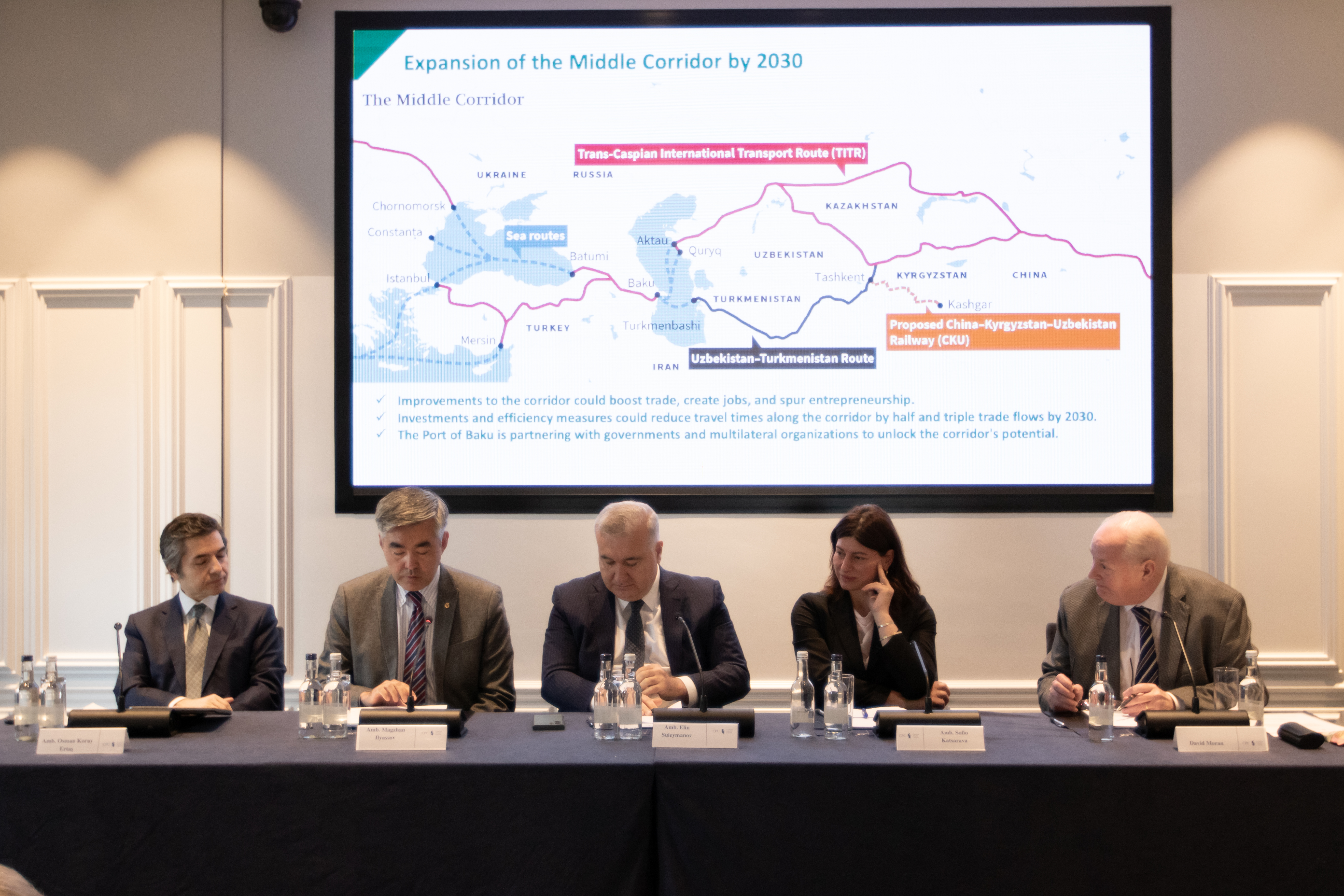
Ambassador Katsarava also spoke on the cooperative efforts between Georgia and Azerbaijan in regard to COP29. “Coordination between Georgia and Azerbaijan is exemplary,” she noted. Commenting on Georgia’s green energy transition, Ambassador Katsarava highlighted, “In Georgia, 85% of electricity comes from renewable sources, and we also contribute to a number of infrastructural projects. That’s obviously not enough, but we are working to be part of the larger infrastructural projects that would contribute to attacking climate crisis.”
Elin Suleymanov, Ambassador of Azerbaijan to the UK, discussed the increased importance of the Middle Corridor, as well as heightened interregional cooperation in connectivity and green energy transition. “With the most recent [conflict] between Israel [and Gaza], you consider the entire air traffic between Asia and Europe is basically routed over Azerbaijani and Georgian airspace. That by itself shows how important this part of the world is.” He then expanded on Azerbaijan’s efforts to transport green energy to Europe, “We are working with Georgia on delivering green energy today to European markets. It goes to Azerbaijan, Georgia, under the Black Sea, to Romania, and then to Hungary.”
“If the vision is to have the region integrated and working together, then everything should be dedicated to supporting that,” added Suleymanov. “This means supporting the conversation between Armenia and Azerbaijan, to bring those two nations together. And finally, it should be without inserting and injecting outside interests.”
Magzhan Ilyassov, the Ambassador of Kazakhstan to the UK, stressed that one of Kazakhstan’s priorities is to unlock the full potential of the Middle Corridor, ensuring that it will be utilized not simply as a temporary alternative or secondary route. “We have to turn it into a viable route that exists by itself.... For now, our ambition when I say ‘ours’ is not only [Kazakhstan] but also all of the countries that are presented here,” Ilyassov emphasized.
Kazakhstan’s Ambassador also spoke of his country’s priorities at COP29: “For Kazakhstan, and for Central Asian countries, one issue that we will be focused on is water…. If you look at the Caspian [Sea], which is losing water in the last couple of years very dramatically and unprecedently, this is also important for transition and transport logistics because the ports have less access to water.”
Osman Koray Ertaş, the Ambassador of Türkiye to the UK, drew attention to the need for sustainable, affordable, and inclusive development in the region, highlighting the importance of investing in railroads, pipelines, and energy. While discussing the growing interest from European investors in the Middle Corridor, Ambassador Ertaş underlined, “The EU Investors Summit was a welcomed initiative for all of us. We hope the amount mentioned, about 10-plus billion euros, is quite important for the region. Of course, this is not out of nowhere--there are political reasons, economic reasons, and also there is the reality of climate change.”
Türkiye’s Ambassador expanded on his country’s role in the Middle Corridor: “There are major projects that are railroads, pipelines.... The same goes for Azerbaijani natural gas which has gone all the way to Europe through TANAP to Georgia.... We have already been investing a lot in this Corridor and are trying our best to do more.”
The next conference panel was entitled, “Maximizing Development Impact: Prioritisation & Coordination,” and featured keynote addresses from high-level representatives from the Caspian region and was moderated by CPC Board Member Dr. Marsha McGraw Olive. Speakers included: Ekaterina Miroshnik, Director, Head of Infrastructure-Eurasia Team, European Bank for Reconstruction and Development (EBRD); Gaidar Abdikerimov, Secretary General, Team of International Association “Trans-Caspian International Transport Route”; Sophie Ibbotson, Development Consultant, World Bank; and Alexander Milne, Head, Eurasia, Middle East, and Africa, TheCityUK.
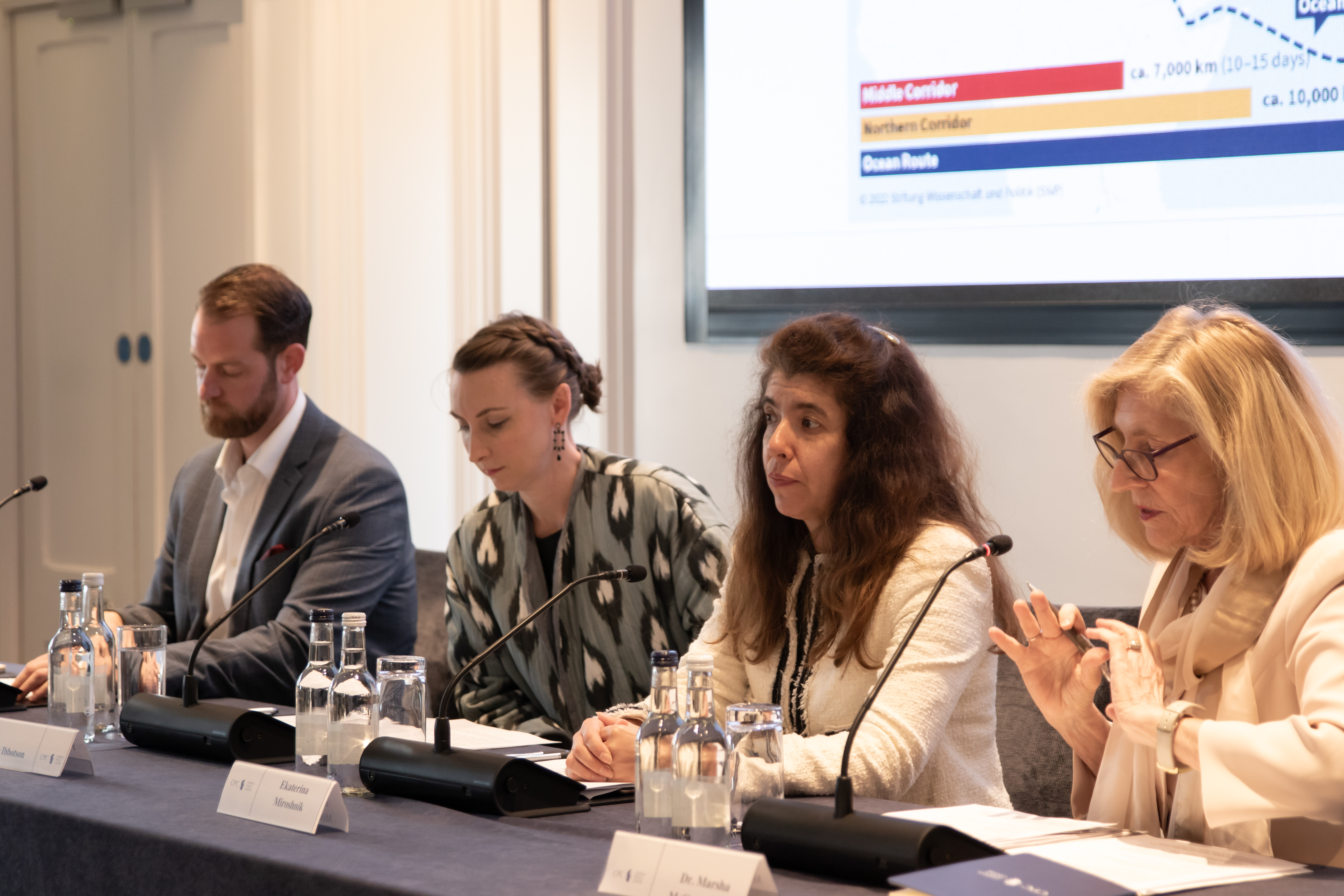
To improve the efficiency of the Middle Corridor, Ekaterina Miroshnik, EBRD Director and Head of Infrastructure-Eurasia Team, spoke about the potential 30 investment projects identified by EBRD’s recent study of the region. She noted that the study identified key priority infrastructure investment needs in all five Central Asian countries to significantly improve the network, with an estimated total amount of €18.5 billion. “None of these projects will be possible without soft measures – tariff improvements, liberalisation of the market, and private-sector participation,” added Miroshnik.
Sophie Ibbotson, a World Bank Development consultant, spoke about the need for cooperation and diplomatic recognition to move the Middle Corridor’s development forward. “In almost all of the literature that you read about the Middle Corridor, the conversations people have focus on its strategic value to Europe and China, connecting the two and transporting goods between,” she said. “But for me, the real appeal of the Middle Corridor is its potential to improve intra-regional, as well as inter-regional, connectivity.”
Commenting on the challenges of fostering regional development, Ibbotson stated that, “High transport costs are one of the top factors which are limiting the growth of manufacturing in Central Asia and are putting an unnecessary restriction on economic growth.” In this regard, she added, “If we can reduce the transport costs, there are countries like Kazakhstan, Uzbekistan, Kyrgyzstan, Tajikistan [that would] all become much more attractive to investors and to international buyers interested in products that could sell.”
Alexander Milne, head of Eurasia, the Middle East and Africa for TheCityUK, focused on the potential for partnerships between the UK and countries in the region, particularly in the spheres of regulatory and business environments. “We at TheCityUK have done a lot of projects across the region, pretty much all countries along the route. We are heavily involved in the international arbitration center in Kazakhstan as part of the Astana International Financial Center. We’ve also done some work in the Türkiye Stock exchange on green finance,” Milne underlined.
“I think there are two main things I want to focus on and that really is the kind of overarching theme of the favorable regulatory and business environment along the countries enroute,” Milne said. “We’ve obviously heard a lot about the movement of goods and the time needed to cross borders. Certainty, predictability, and political will all help unblock issues along the way. The second is alignment of the Middle Corridor project with a green and sustainable agenda and under that, pursuing more partnerships with partner countries, potentially including the UK,” he concluded.
Gaidar Abdikerimov, Secretary General of the Team of International Association “Trans-Caspian International Transport Route,” also discussed the need for better communication and collaboration among parties, as well as ways to reduce bottlenecks along the route. “Investments in both hard and soft infrastructure are necessary for improving the route,” he said. “Soft infrastructure investments, such as digitalization, and improving communication among parties, as well as hard infrastructure investments, such as construction of the railroads, ports, and terminals can help in reaching the goals to maximize the Middle Corridor’s potential by 2027.”
Varuzhan Nersesyan, the Ambassador of Armenia to the UK, began the second ambassadorial panel by discussing the significance of unblocking transport routes and potential opportunities for the greater Caspian region and the South Caucasus. The Ambassador stated, “From Armenia’s perspective, this is about peace, deeper roots of democracy in the region, and about communication and connectivity.”
Speaking about the Middle Corridor, Ambassador Nersesyan said, “Armenia is ready to join all those projects and roads and corridors that can join Armenia through its proposal called, Crossroads of Peace…. For us, the crucial point in this is the respect of sovereignty. Each country, each road should act on the basis of the respect of territorial integrity.”
The Armenian ambassador also commented on bringing COP29 to the Caucasus. “This is a result of the historic achievement on December 7, 2023, between the administration and the Prime Minister of Armenia and the administration and President of the Azerbaijan Republic,” he noted. “They issued a historic statement that made COP29 happen on the basis of mutual compromises. This is yet another [example of proof] that we were able to achieve between us neighboring countries—a successful thing to happen, irrespective of the huge historic heritage and legacy that we have.”
Picking up on promoting regional integration, Ulan Djusupov, the Ambassador of the Kyrgyz Republic to the UK, said, “Promoting regional integration and cooperation in Central Asia by fostering closer ties with neighboring countries, Kyrgyzstan aims to strengthen political stability, security, and peace in our region.” Djusupov added, “We are looking to improve transport roads in our country and develop new transport projects, which include the construction of the China-Kyrgyzstan-Uzbekistan railway and other internal highway and railway roads.”
The final panel addressed How to Do Business Better Along the Middle Corridor and highlighted successful business practices and opportunities in the region. Speakers from the final panel emphasized the importance of the Caspian region for international trade and transit, and they pointed out the need for educational programs, digital trade solutions, and active engagement to build resilient supply chains. Moderated by CPC Board Member Dr. Roger Kangas, the discussion featured Marco Forgione, Director General, Institute of Export and International Trade; John Patterson OBE, Chairperson, British Chamber of Commerce Azerbaijan; Michael Denison, Senior International Adviser, BP; and Charles Hendry, the Prime Minister’s Trade Envoy for Azerbaijan, Kazakhstan and Turkmenistan, 2012-15, and UK Minister of State for Energy and Climate Change 2010-12.
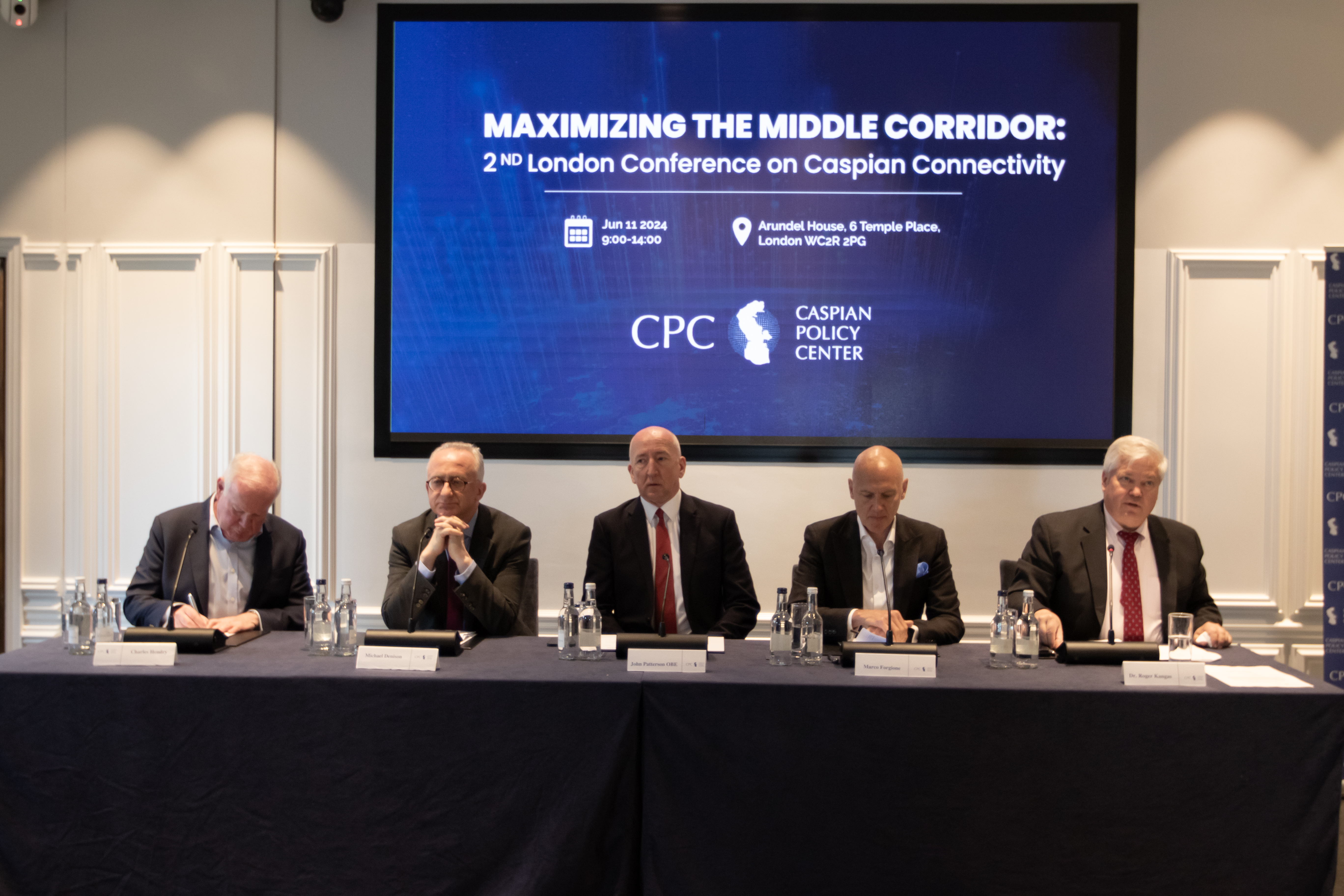
Marco Forgione addressed the importance of capacity building and understanding within businesses to exploit the opportunities of cross-border trade in Central Asia, stating, “The role that Central Asia will play in the future narrative is going to be key to the development of the emerging supply chain network.” He added that, “It is key that we secure the knowledge and expertise not just as the officials, but also for businesses to utilize the cross-border trade and trade digitalization.”
“There's really not too much in the way of businesses looking to come and develop the Middle Corridor,” John Patterson OBE said. “And at the moment, there are not enough businesses knocking on the door to say, ‘We’re interested in developing the Middle Corridor,’” he added. Speaking on the business climate in Azerbaijan, Patterson stressed, “It’s clear that the appetite is there and the legal system is coming. The reforms have taken place.”
Turning to the energy sector, Michael Denison commented on BP’s involvement in developing the energy sector of the region, particularly in Azerbaijan. Denison stated that BP has invested, “…more than $85 billion into the sector to get this really quite substantial energy system from the Caspian Sea up and running, bringing oil and gas into the European and global markets.” Denison also discussed the development of energy infrastructure in the Caspian region, with a specific focus on individual state agreements.
Charles Hendry added that the importance of the region was once again highlighted during David Cameron’s visit to the region a few weeks ago. “His message was to say, ‘look, we understand your historic ties to Russia, but that should not stop you developing working links with the UK as well.’ And so, the door is very firmly open to seeing more activity and more connections in the space,” Hendry noted.
Commenting on the business environment in the Caspian region, Hendry said, “These aren’t places where you can fly in and expect [immediately] to sign a contract.... You’ve got to be willing to go outside the capital cities and the major trading centers and show that you’re committed to building that relationship.”
The conference concluded with remarks by CPC Board Chairman, Ambassador (ret.) Richard Hoagland. He emphasized the need for the United States, the United Kingdom, and the European Union to take advantage of the historic opportunities and avoid contradictions by “working together, not in parallel, in the Caspian region.”
In summary, the Second Caspian Connectivity Conference underscored the importance of strategic partnerships and cooperative solutions to enhance connectivity and trade across the Middle Corridor, benefiting both the United Kingdom and the Caspian Region.